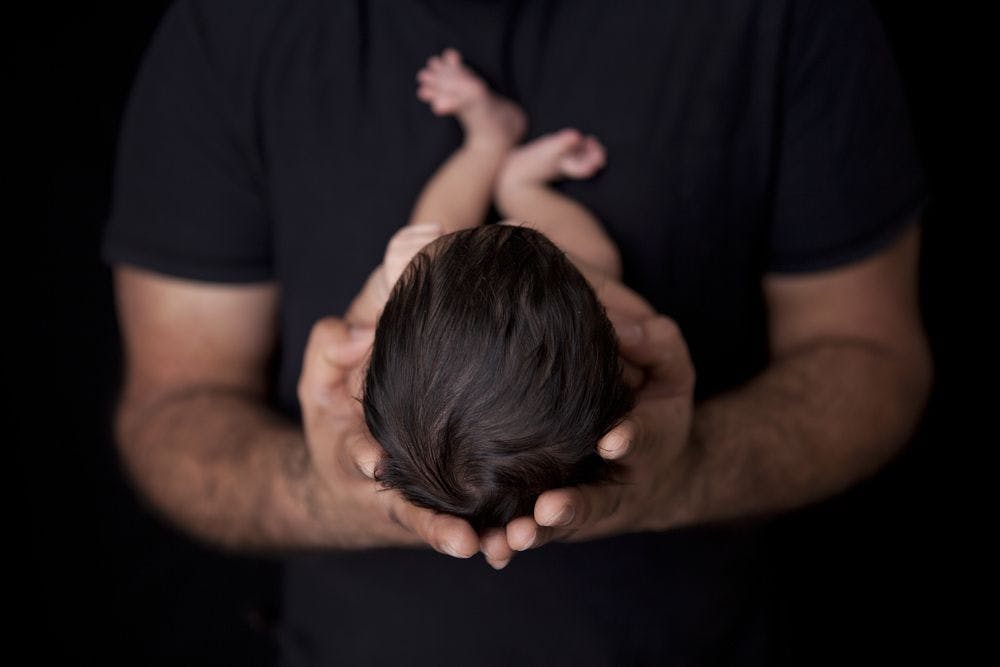Could increasing paid paternity leave benefit dads’ mental health?
updated on Oct 2, 2020

As France doubles paid paternity leave for new fathers, we ask, how could this change benefit dads’ mental health?
At the end of September French President Emmanuel Macron announced plans to double paid paternity leave for new fathers, from 14 days to 28. Coming into action from July 2021, the change has been welcomed by many, with President Macron pointing to a survey that found that 80% of the French population agreed that the current length of paternity leave was too short.
In the lead up to the announcement, Macron had set up a commission led by psychiatrist Boris Cyrulnik, who examined a child’s first 1,000 days. Considering the results of the study, the commission recommended nine weeks of paternity leave – guidelines that may be some way off from working their way into policy, but which give insight into the importance of a father’s presence during these first few months of life.
Across Europe, the length of paternity leave differs quite drastically. In Sweden, citizens can take 60 days paternity leave at 80% salary, in Spain they can take 12 weeks full paid – set to increase to 16 weeks in 2021 – Finland offers 54 days at 70% salary, and Portugal offers 25 days at full salary.
Here in the UK, new dads are entitled to just two weeks at 90% of their salary or £151.20 per week – whichever is lower.
For Lee Downes – founder of mobile app Dad AF – as for many other dads, this current entitlement is not enough.
“From the moment my son was born I, and many other fathers I have spoken to, was very aware of the ticking clock on my two weeks to send me back to work, so I could keep my job and provide for my new, larger family,” Lee tells Happiful.
“The current two week leave not only limits the interaction of the father with his new child, so he has less time to create a bond, but it also gives him precious little time to care for his partner and the new world and role they have been thrust into.
Award-winning parenting and lifestyle blogger John Adams gave up a career to raise his daughters and, as he reflects on those first few months of fatherhood, he highlights how vital paternity rights are.
"When my children were born, I took a month off work – taking a mix of statutory paternity pay and paid holiday leave," John explains."It's just as well I did, as there were complications after both births and I was needed at home. The idea a woman can recover from a birth in two weeks is ludicrous and that puts the entire family unit under avoidable stress.
"The return to work was tough mentally especially after Helen, my first daughter, was born. As a men's rights issue, the lack of ringfenced paternity pay is probably only second to the male suicide rate. The lack of fair paternity pay stops men from taking time off work and getting involved with their children and families. This is a cause of distress and stress for many men and contributes to poor mental health and poor family relationships that can last a lifetime."
New fatherhood can be an incredibly difficult time, with the parents’ charity NCT noting that the number of men who struggle with depression in the first year after the birth of their child is double that of the general population. As with any mental illness, depression is complex and rarely caused by one thing, but the NCT points to financial pressure, and a disrupted routine as contributing factors – things that could be alleviated to some extent, with more substantial paternal care.
Additionally, a Swedish study that examined the effects of a 2012 policy change found that, by affording fathers more flexibility at work, mothers were less likely to experience postpartum health complications or struggle with their mental health.

The number of dads who struggle with depression after birth is double the general population
Know the signs of postnatal depression in men
According to the NCT, postnatal depression in fathers can include the following:
- Fear, confusion, helplessness and uncertainty about the future
- Withdrawal from family life, work and social situations
- Indecisiveness
- Frustration, irritability, cynicism and anger
- Marital conflict
- Partner violence
- Negative parenting behaviours
- Alcohol and drug use
- Insomnia
- Physical symptoms like indigestion, changes in appetite and weight, diarrhoea, constipation, headaches, toothaches, and nausea
If you are struggling with postnatal depression, reach out to friends, family, or your GP.
And the barriers to fatherhood can be tracked throughout dads’ lives, with a poll from PowWowNow finding that nearly half of fathers have been discriminated against for taking care of their children, facing job loss, demotions, and verbal abuse – leading eight in 10 fathers to call for more flexible work to help them balance family life.
“Is it any wonder that, in the UK, it’s often the mother who chooses to work flexibly, or denies herself a promotion?” Asks Lee. “By enforcing such a short paternity leave there is always going to be a correlation with the women's role as the primary caregiver being heightened and no doubt this pushes into the ongoing gender pay gap issue.”
As Lee sees it, it’s about time we started making fatherhood, and fathers' mental health a priority, for the benefit of everyone in our society.
“With so many things evolving for the better, why not help men's mental health by providing better paternity leave?” He argues. “Then we don't end up working so hard to create memories and make up for the time we missed when we already have those memories and are secure in our minds that we’re great dads.”
Find out more about current UK paternity leave entitlement by visiting the gov.uk site.

